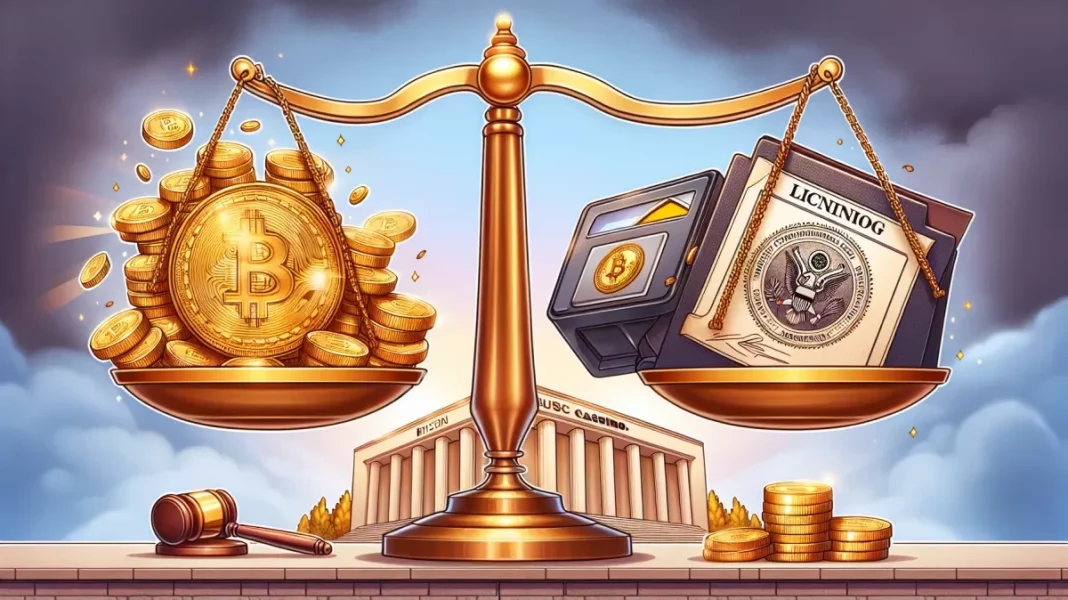In an age where digital currencies and online transactions have become increasingly commonplace, the intersection of Bitcoin and gambling has sparked a new arena of entertainment and speculation. Bitcoin casinos, platforms that allow users to gamble using the cryptocurrency, have proliferated in recent years, riding the wave of Bitcoin’s surging popularity. With this surge, however, comes the critical importance of legal compliance and accreditation—a facet that’s just as vital for players as it is for the platforms themselves.
The concept of a Bitcoin casino operates under the same tenets as traditional online gambling sites, but there’s a fundamental difference. Bitcoin casinos leverage the unique features of cryptocurrency to offer users anonymity, reduced fees, and often, faster transaction times. This novel offering has not gone unnoticed by both enthused patrons and regulatory bodies.
Regulation is key in the gambling industry, with licensing serving as the cornerstone of legal operations. Bitcoin casinos are no exception. As cryptocurrency falls into a somewhat grey regulatory area, licensing these operations has its unique challenges. Licensing ensures that a Bitcoin casino operates with a certain level of standards, offers some form of consumer protection, and complies with the anti-money laundering (AML) and know your customer (KYC) policies—policies that are standard in the financial industry.
There are several jurisdictions around the world that provide licensing for online gambling operations, which now includes Bitcoin casinos. Jurisdictions such as Malta, Curacao, Gibraltar, the Isle of Man, and some Native American territories in Canada are among the most well-known and respected licensing authorities in the online gaming world. These jurisdictions have tailored their licensing processes to accommodate the burgeoning digital currency space, incorporating comprehensive vetting procedures to ensure operators uphold their standards.
Securing a license is no easy feat for a Bitcoin casino operator. The process involves extensive background checks, software and operational audits, and ongoing oversight to maintain fairness and security. This rigorous process helps weed out potential scams and ensures that legitimate operations can build trust with consumers.
For Bitcoin casino enthusiasts, playing at a licensed venue is paramount to ensure safety and fairness. A license is an indicator that a Bitcoin casino is committed to upholding the regulatory standards in areas like game fairness, which often involves the use of provably fair algorithms. These algorithms are unique to cryptocurrency gaming and allow players to verify the fairness of each game outcome, bolstering the trustworthiness of an operation.
Moreover, legal compliance goes beyond just having a shiny plaque on the virtual wall. Accredited Bitcoin casinos are often mandated to keep player funds in segregated accounts, separate from the casino’s operating funds. This arrangement ensures that players’ balance remains safe, even in the unlikely event of the casino’s financial troubles. It also implies regular audits and financial reports are submitted to regulatory bodies, ensuring financial transparency.
Accreditation aligns Bitcoin casinos with responsible gambling practices, a framework for protecting players from the potentially harmful impacts of excessive gambling. Licensed establishments are often required to implement features that allow players to set deposit limits, self-exclude, or seek help for gambling addiction. This approach not only benefits players but bolsters the reputation of the casino itself.
Despite these safeguards, Bitcoin casino licensing is not an ultimate panacea. The decentralized nature of cryptocurrency means players may still face challenges in seeking recourse for disputes outside the jurisdiction of the licensing authority. That said, a licensed Bitcoin casino grants a substantially higher level of credibility than an unlicensed counterpart.
From a legal perspective, the licensing of Bitcoin casinos is a significant development for consumer protection. It offers a framework that, if followed, can lead to a sustainable and trustworthy industry. However, as with all technological advancements, regulations need time to adapt fully. While authorities continue to refine their approaches to cryptocurrency regulation, players can do their part by choosing to patronize licensed and accredited Bitcoin casinos.
In an ever-evolving landscape shaped by technology and regulation, the world of Bitcoin gambling is finding its footing. Licensing and accreditation serve as critical components in bridging the gap between innovation and consumer safety, paving the way for a future where digital currency casinos are as commonplace and regulated as their traditional fiat counterparts. It’s an exciting time for enthusiasts of both Bitcoin and gambling, as each bet placed at a licensed Bitcoin casino represents not just a chance for reward, but a step towards a regulated, credible future for cryptocurrency-based entertainment.



